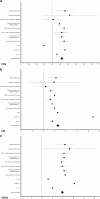Health status instruments for patients with COPD in pulmonary rehabilitation: defining a minimal clinically important difference
- PMID: 27597571
- PMCID: PMC5011855
- DOI: 10.1038/npjpcrm.2016.41
Health status instruments for patients with COPD in pulmonary rehabilitation: defining a minimal clinically important difference
Abstract
The minimal clinically important difference (MCID) defines to what extent change on a health status instrument is clinically relevant, which aids scientists and physicians in measuring therapy effects. This is the first study that aimed to establish the MCID of the Clinical chronic obstructive pulmonary disease (COPD) Questionnaire (CCQ), the COPD Assessment Test (CAT) and the St George's Respiratory Questionnaire (SGRQ) in the same pulmonary rehabilitation population using multiple approaches. In total, 451 COPD patients participated in a 3-week Pulmonary Rehabilitation (PR) programme (58 years, 65% male, 43 pack-years, GOLD stage II/III/IV 50/39/11%). Techniques used to assess the MCID were anchor-based approaches, including patient-referencing, criterion-referencing and questionnaire-referencing, and the distribution-based methods standard error of measurement (SEM), 1.96SEM and half standard deviation (0.5s.d.). Patient- and criterion-referencing led to MCID estimates of 0.56 and 0.62 (CCQ); 3.12 and 2.96 (CAT); and 8.40 and 9.28 (SGRQ). Questionnaire-referencing suggested MCID ranges of 0.28-0.61 (CCQ), 1.46-3.08 (CAT) and 6.86-9.47 (SGRQ). The SEM, 1.96SEM and 0.5s.d. were 0.29, 0.56 and 0.46 (CCQ); 3.28, 6.43 and 2.80 (CAT); 5.20, 10.19 and 6.06 (SGRQ). Pooled estimates were 0.52 (CCQ), 3.29 (CAT) and 7.91 (SGRQ) for improvement. MCID estimates differed depending on the method used. Pooled estimates suggest clinically relevant improvements needing to exceed 0.40 on the CCQ, 3.00 on the CAT and 7.00 on the SGRQ for moderate to very severe COPD patients. The MCIDs of the CAT and SGRQ in the literature might be too low, leading to overestimation of treatment effects for patients with COPD.
Conflict of interest statement
J.W.H.K. reports receiving personal fees from Novartis; personal fees from Boehringer Ingelheim; grants and personal fees from GSK; grants from Stichting Zorgdraad; personal fees from IPCRG; personal fees from Springer Media; and travel arrangements from Chiesi BV, GlaxoSmithKline BV and IPCRG, all outside the submitted work. K.S. received lecture fees from Boehringer, AstraZeneca, Berlin Chemie, Novartis, Chiesi, Mundipharma, Takeda, GSK and MSD, all outside the submitted work. T.v.d.M. developed the CCQ and holds the copyright. J.W.H.K. is an Associate Editor of npj Primary Care Respiratory Medicine, but was not involved in the editorial review of, nor the decision to publish, this article. The remaining authors declare no conflict of interest.
Figures

References
-
- Global Initiative for Chronic Obstructive Lung Disease (GOLD). Global Strategy for the Diagnosis, Management and Prevention of COPD. 2016; Available at http://www.goldcopd.org/uploads/users/files/GOLD_Report%202016.pdf. Accessed on 7 January 2016.
-
- Jones, P. W. et al. Development and first validation of the COPD Assessment Test. Eur. Respir. J. 34, 648–654 (2009). - PubMed
Publication types
MeSH terms
LinkOut - more resources
Full Text Sources
Other Literature Sources
Medical
Research Materials
Miscellaneous

